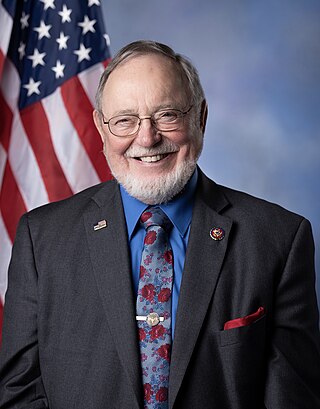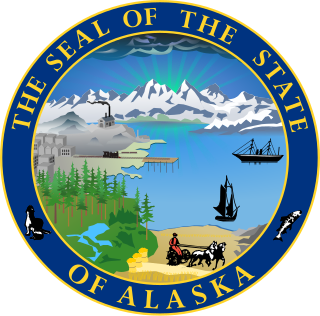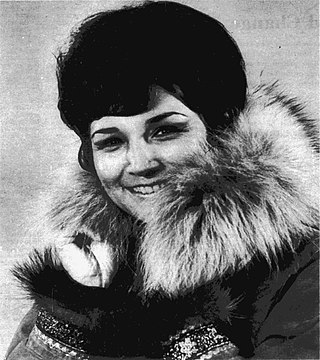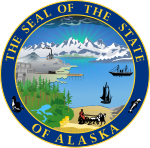
Walter Joseph Hickel was an American businessman, real estate developer, and politician who served as the second governor of Alaska from 1966 to 1969 and 1990 to 1994, as well as U.S. Secretary of the Interior from 1969 to 1970. He worked as a construction worker and eventually became a construction company operator during Alaska's territorial days. Following World War II, Hickel became heavily involved with real estate development, building residential subdivisions, shopping centers and hotels. Hickel entered politics in the 1950s during Alaska's battle for statehood and remained politically active for the rest of his life.

Donald Edwin Young was an American politician from Alaska. He is the longest-serving Republican in House history, having been the U.S. representative for the state's at-large congressional district for 49 years, from 1973 until his death in 2022.

Nicholas Joseph Begich Sr. was an American counselor, educator and politician. He served in the Alaska state senate for eight years before being elected in 1970 as a member of the United States House of Representatives from Alaska. He is presumed to have died in the crash of a light aircraft in Alaska in October 1972; his body was never found. He was a member of the Democratic Party.

Mark Peter Begich is an American politician and lobbyist who served as a United States senator from Alaska from 2009 to 2015. A member of the Democratic Party, he served as mayor of Anchorage from 2003 to 2009.

The 2008 United States Senate election in Alaska was held on November 4, 2008. Incumbent Republican U.S. Senator and former President pro tempore Ted Stevens ran for re-election for an eighth term in the United States Senate. It was one of the ten Senate races that U.S. Senator John Ensign of Nevada, the chairman of the National Republican Senatorial Committee, predicted as being most competitive. The primaries were held on August 26, 2008. Stevens was challenged by Democratic candidate Mark Begich, the mayor of Anchorage and son of former U.S. Representative Nick Begich.

Mary Sattler Peltola is an American politician and former tribal judge serving as the U.S. representative from Alaska's at-large congressional district since September 2022. A member of the Democratic Party, she previously served as a judge on the Orutsararmiut Native Council's tribal court, executive director of the Kuskokwim River Inter-Tribal Fish Commission, Bethel city councilor, and member of the Alaska House of Representatives.

The Alaska congressional election of 1970 was held on Tuesday, November 3, 1970. The term of the state's sole Representative to the United States House of Representatives expired on January 3, 1971. Incumbent Howard Wallace Pollock retired to run for Governor of Alaska. The winning candidate would serve a two-year term from January 3, 1971, to January 3, 1973. Nick Begich defeated former Alaska Commissioner of Economic Development & Anchorage banker Frank Murkowski, by a margin of 10.2%.

The Libertarian Party of Alaska is the affiliate of the Libertarian Party (LP) in Alaska, headquartered in Anchorage.

The 2014 United States Senate election in Alaska took place on November 4, 2014, to elect a member of the United States Senate to represent the State of Alaska, concurrently with the election of the governor of Alaska, as well as other elections to the United States Senate in other states and elections to the United States House of Representatives and various state and local elections.

The 2012 Alaska general elections were held on November 6, 2012. Primary elections were held on August 28, 2012.

The 2014 United States House of Representatives election in Alaska was held on November 4, 2014, to elect the U.S. representative from Alaska's at-large congressional district, who will represent the state of Alaska in the 114th United States Congress. The election coincided with the elections of a Class II U.S. Senator and the Governor of Alaska, as well as other elections to the United States Senate in other states and elections to the United States House of Representatives and various state and local elections.

The 2016 United States Senate election in Alaska was held on November 8, 2016, to elect a member of the United States Senate to represent the State of Alaska, concurrently with the 2016 U.S. presidential election, as well as other elections to the United States Senate in other states and elections to the United States House of Representatives and various state and local elections.

The 2016 United States House of Representatives election in Alaska was held on November 8, 2016, to elect the U.S. representative from Alaska's at-large congressional district, who will represent the state of Alaska in the 114th United States Congress. The election coincided with the 2016 U.S. presidential election, as well as other elections to the House of Representatives, elections in the United States Senate, and various state and local elections.

The 2018 Alaska gubernatorial election took place on November 6, 2018, to elect the governor and lieutenant governor of Alaska. In the primaries for recognized political parties, candidates for governor and lieutenant governor run separately. The winners of each respective primary for governor and lieutenant governor then become a joint ticket in the general election for their political party. Incumbent Independent governor Bill Walker was seeking re-election in what was originally a three-way race between Walker, Republican former Alaska state senator Mike Dunleavy, and Democratic former Alaska U.S. Senator Mark Begich. Despite Walker dropping out on October 19, 2018, and endorsing Begich, Dunleavy won in what was the only gubernatorial gain by a Republican candidate in 2018. As of 2024, this was the last time the Governor's office in Alaska changed partisan control. Walker later unsuccessfully ran for Governor of Alaska in 2022.

The 1973 Alaska's at-large congressional district special election was held on March 6, 1973, to elect the United States representative from Alaska's at-large congressional district. Incumbent Democratic Representative Nick Begich Sr. had won reelection in 1972, but had gone missing shortly before the election.

The November 2022 United States House of Representatives election in Alaska was held on Tuesday, November 8, to elect a member of the United States House of Representatives to represent the state of Alaska. Democratic incumbent Mary Peltola won re-election to a full term in office, defeating Republicans Sarah Palin and Nick Begich III and Libertarian Chris Bye in the runoff count.

Jules Winslow Wright was an American businessman and politician from Alaska.

The 2022 Alaska at-large congressional district special election was held on August 16 to fill the seat left vacant after the death of Republican incumbent Don Young. Mary Peltola was elected in a 3-way race against former governor Sarah Palin and Nick Begich III in the election, becoming the first Alaska Native and woman to represent Alaska in the House.

Laura Mae Bergt was an Iñupiaq athlete, model, politician, and activist for the Iñupiat and other Indigenous Alaskans. Born in the Northwest Arctic Borough of Alaska to bi-racial parents, she grew up in Nome and Kotzebue before attending high school in Sitka. Involved in the Native Olympic movement, she was both a nine-times winner of the Arctic Circle blanket toss event and served as chair of the World Eskimo Indian Olympics in 1966. She worked as a promoter for the new state of Alaska attending trade shows and making marketing appearances as a spokeswoman and guest on radio and television programs. From the 1960s, she worked in various policy positions at the tribal, local, state, and national level to address issues like disability, education, employment opportunities, housing, and poverty, and promoting the rights of Indigenous people.

The 2024 United States House of Representatives election in Alaska was held on November 5, 2024, to elect a member of the United States House of Representatives to represent the state of Alaska from its at-large congressional district. The election coincided with the 2024 U.S. presidential election, as well as other elections to the U.S. House, elections to the United States Senate, and various other state and local elections.
























